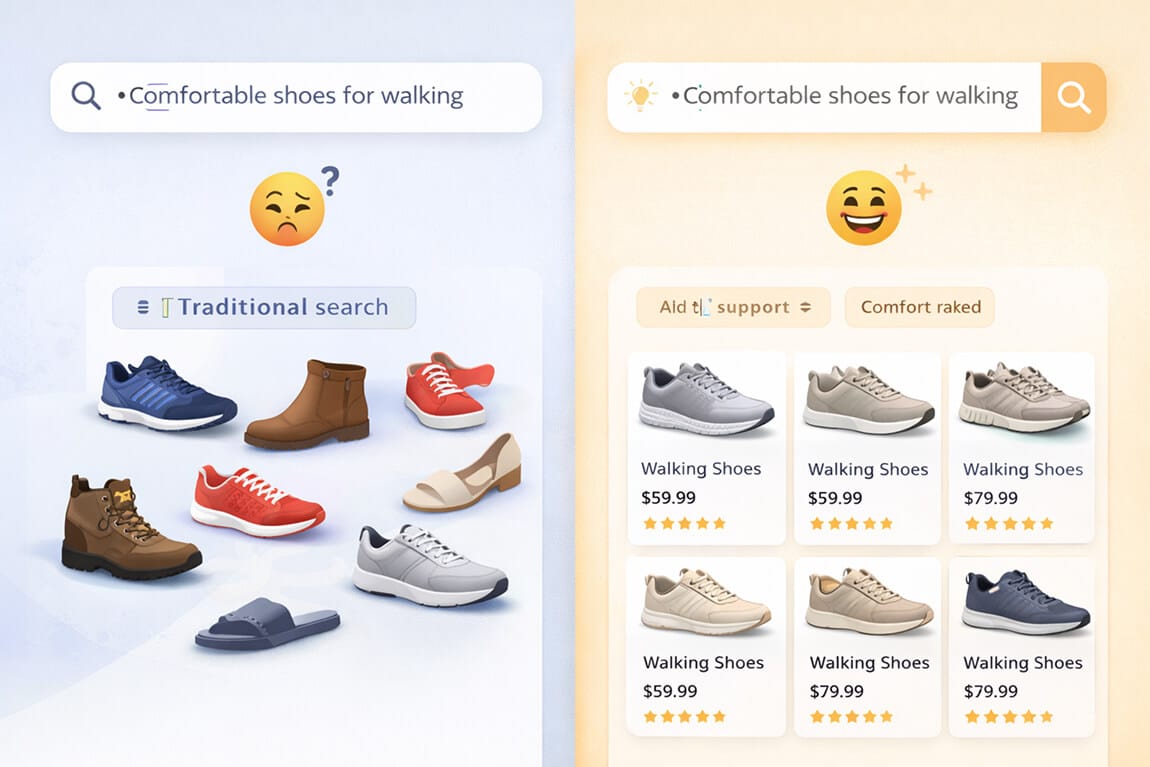
Top 7 Enterprise Search Softwares for E-commerce 2024
Every second counts when it comes to e-commerce. If your customers can’t find what they need quickly, they leave, and so does the money. Frustrating, right? That’s where enterprise search software comes in. These tools are like supercharged search engines for online stores, helping customers find what they’re looking for quickly and easily. Today, we’ll look at how these powerful search solutions work, why they’re a game-changer for online businesses and the top 7 enterprise search software your online store needs this year.
What is Enterprise E-commerce Search?

Enterprise e-commerce search refers to advanced search solutions specifically designed for large-scale online stores. Unlike basic search tools, these solutions are built to handle complex product catalogs, offer enhanced user experiences, and integrate seamlessly with other e-commerce functionalities. Standard search solutions, like the ones often used by smaller businesses, are limited in scope. They can work well for simple websites with a few hundred products, but they struggle with the demands of a large online store. Enterprise search systems are designed to handle these complexities. They offer features like faceted search, and semantic search, which understand the intent behind a query, not just the exact keywords. Scalability is another key difference. As an e-commerce business grows, the amount of data it needs to process grows, too. Enterprise search solutions can easily scale to index millions of items without losing performance.
Why is Enterprise Search Crucial for E-commerce Success?
Impact on User Experience
A powerful search engine is necessary for a positive user experience in e-commerce. When customers visit an online store, they expect to find what they're looking for without any difficulty. If the search function is slow, or difficult to use, customers will leave the site out of frustration, leading to higher bounce rates. Let's just say enterprise search solutions improve navigation by offering more relevant and personalized search results. For example, if a customer searches for "red handbags," an advanced search engine can not only show red handbags but also suggest related products like cross body bags or purses.

Conversion Rate Optimization
Now, with enterprise ecommerce search, it doesn’t just help you find what you want, it can also help the store sell more products. How? Well, when people find exactly what they’re looking for quickly, they’re more likely to buy it. And if the search engine suggests other products customers might like, they end up buying even more. A report by Forrester Research found that nearly 43% of website visitors who use the search function account for almost 60% of total revenue.

This means that a good search engine can help the store make more money, just by making it easier for you to find what you want.
Competitive Advantage
The ecommerce market is so saturated that you need to rely on more than just basic search tools to thrive. If there are two ecommerce stores, and both sell the same products. But in one store, you can find exactly what you want in seconds because their search engine is so smart and can accommodate complex requests. In the other store, it takes forever to find anything because their search engine isn’t very good. Which store would you choose? Most people would pick the first one, right? Absolutely! If a store has a really good search engine, people will like shopping there more, and they’ll keep coming back. This gives that store an advantage over other stores that sell the same products.
Essential Features of Enterprise E-commerce Search
Faceted Search
Functionality
Faceted search is a feature that helps you filter search results based on different attributes, or "facets," of a product. Suppose you’re on a website looking for shoes, with faceted search, you can narrow down the options by selecting things like brand, price range, color, and size. This means you don’t have to scroll through hundreds of shoes that don’t match what you want. Instead, you can quickly find the ones that are just right for you. For example, if you want to buy black Nike sneakers that cost less than $100, you can use the faceted search to select "Nike" under brand, "black" under color, and "under $100" under price. In just a few clicks, you’ll see only the shoes that match all your criteria.

Benefits for Merchants
Faceted search doesn’t just help you as a shopper, it also benefits the people who run the online store, known as merchants. When customers find what they're looking for quickly, they'll definitely make a purchase. This means merchants can sell more products and make more money. Besides, faceted search reduces search abandonment, which happens when people leave the website because they can’t find what they want. When shoppers can easily filter down to the exact products they want, they won’t easily get frustrated and leave.
Autocomplete and Predictive Search
How It Works
Autocomplete and predictive search are features that make the search process faster and easier. As soon as you start typing in the search box, the search engine begins to suggest possible search queries and products based on what you’ve typed so far. For example, if you start typing "Nike sneakers," the search engine might immediately suggest "Nike sneakers men," "Nike sneakers women," or even specific product names like "Nike Air Max." This saves you time because you don’t have to type out the full search query, and it also helps you find what you’re looking for more quickly.

Benefits
These features are super helpful because they reduce the effort you need to put into searching. If you’re not sure how to spell something, autocomplete can correct your spelling and guide you to the right products. It also speeds up product discovery because you don’t have to think too hard about what to type, just start typing, and the search engine does the rest. For merchants, autocomplete and predictive search can increase conversion rates, which means more people who search for something actually end up buying it. This is because the faster and easier it is to find products, the more customers will complete their purchase.
Relevance Algorithms
Importance of Relevance
Relevance algorithms are like the search engine’s decision-makers. They decide which products to show you first based on how well they match your search terms, how popular they are, and what other users with similar searches have liked. The goal is to make sure that the most relevant products appear at the top of the search results, so you don’t have to scroll through a bunch of stuff that doesn’t interest you. For instance, if you search for "t-shirt women," the relevance algorithm will show you the best-selling t-shirts first or the ones with the highest customer ratings. This way, you will easily find a product you love.

Customization
One of the cool things about relevance algorithms is that merchants can customize them. This means they can prioritize certain products or categories that they want to promote. For example, if a store is having a big sale on winter coats, they can adjust the algorithm to show winter coats at the top of search results for related terms. This helps merchants push high-margin products (meaning they make a lot of money from them) or seasonal items that need to be sold quickly.
Synonym Recognition and Handling
Why Synonyms Matter
Most people don't use the same words to describe the same thing. For example, some people might search for "sneakers," while others might use the word "trainers."

Synonym recognition is a feature that allows the search engine to understand that these words mean the same thing and give you the right results, no matter which word you use. This is important because it ensures that you don’t miss out on finding what you want just because you used a different word.
Improving Search Accuracy

When a search engine can recognize synonyms, it reduces the chances of showing you a "zero-results page," which means you don’t get any results for your search.
This makes the search experience more accurate and satisfying because you will find what you’re looking for, even if you use a different term than the one listed on the website. For merchants, this feature helps keep customers on their site, reducing bounce rates and increasing the chances of making a sale.
Mobile Optimization
Importance of Mobile Search
More people are shopping on their phones, which makes mobile optimization a very important part of any e-commerce search engine.

If a website isn’t easy to use on a phone, customers might get frustrated and leave. A good mobile search experience can capture sales that would have been lost otherwise.
Features to Consider
When optimizing for mobile, there are a few key features to keep in mind. First, the search interface should be touch-friendly. Buttons should be big enough to tap without accidentally hitting the wrong thing, and the search results should be easy to scroll through. Also, the website needs to load quickly on a mobile device. If the search results take too long to pop up, customers will lose patience and leave the site.
Advanced Features of Enterprise E-commerce Search
Natural Language Processing (NLP)
How NLP Enhances Search
Natural Language Processing, or NLP, is a technology that allows computers to understand human language the way we naturally speak it. Let's say you want to search for something online, instead of typing “running shoes,” you can type, “What are the best running shoes for winter?” NLP helps the search engine understand this more complex question and give you results that actually answer it, rather than just showing you every pair of running shoes available.

Benefits of NLP
The main benefit of NLP is that it makes searching easier and more effective. You don’t have to worry about using the exact keywords that the website might expect; you can just type your question or request in your own words. For example, if you type “good shoes for hiking in the snow,” NLP will understand that you’re looking for winter hiking boots and show you those results.

This kind of advanced search technology also handles ambiguous queries better. If you type something like “Apple,” NLP can figure out whether you mean the fruit or the tech company based on other words in your query or even your past searches.

Personalized Search
What is Personalized Search?
Personalized search is a feature that tailors the search results you see based on your individual behavior, like the products you’ve viewed before, your purchase history, and your preferences. For example, if you often shop for athletic gear, the search engine might show you sports-related products more prominently when you search for something new.

Benefits for Merchants
Personalized search is incredibly valuable because it helps keep customers engaged. When customers see products that are closely aligned with their interests, they will stay longer on the site, explore more items, and eventually make a purchase. This leads to higher conversion rates, which means more sales for the business. On the flip side, personalization also boosts customer loyalty. If customers consistently find relevant products easily, they'll return to that store the next time they need something. Over time, this can build a strong relationship between the customer and the brand.
AI-Driven Product Recommendations
Role of AI in Search
As you browse and search on an e-commerce site, AI algorithms are constantly analyzing your behavior, what products you click on, how long you spend looking at them, what you’ve purchased before, and more. Using this data, the AI can suggest products that you might like, either by recommending items that are similar to what you’re looking at or by suggesting complementary products.

Impact on Sales
These AI-driven recommendations can have a big impact on sales. By suggesting products that are relevant to what you’re already interested in, the search engine encourages you to add more items to your cart. This not only increases the average order value but also creates more opportunities for upselling and cross-selling.
Voice Search Integration
Emerging Trend
Voice search is becoming increasingly popular, especially with the rise of smart speakers like Amazon Echo, Google Home, and mobile assistants like Siri and Google Assistant. It allows you to search for products online using natural spoken language instead of typing. This trend is growing because it’s convenient and hands-free. Whether you’re cooking in the kitchen, driving, or just relaxing, you can use your voice to find what you need without having to stop and type on your device.
How It Works
Voice search integration in e-commerce works by recognizing and processing your spoken words, understanding what you’re asking for, and delivering relevant search results. For example, you might say, “Show me the best deals on running shoes,” and the search engine will bring up a list of top-rated and discounted running shoes.
Benefits
Voice search offers a more accessible way to shop, especially for people who find it difficult to type or navigate a website manually. It also captures a new segment of customers who prefer using voice commands. As more people adopt smart speakers and mobile assistants, integrating voice search into an e-commerce site can help a business stay ahead of the curve and meet customer needs in a new and innovative way
Search Analytics and Insights
Why Analytics Matter
Search analytics is all about collecting and analyzing data on how people use the search function on a website. This data includes common search queries, how often certain products are clicked on, and the conversion rates for different search terms. When merchants understand this data, they can gain valuable insights into what their customers are looking for, how well their search engine is performing, and where there might be opportunities for improvement.
Using Insights for Optimization
With the insights gained from search analytics, merchants can refine their search functionality to better meet customer needs. For example, if a lot of people are searching for a product that’s out of stock, the store can prioritize restocking that item. Or, if certain search queries are leading to low conversion rates, the merchant should look into why those searches aren’t resulting in sales and make adjustments.
Benefits of Implementing Enterprise E-commerce Search
Improved Customer Experience
Enhanced User Journey
When a customer visits an online store, they want to find what they’re looking for without any trouble. A good search feature makes this possible. For example, imagine you’re looking for a new pair of tracksuits.

If the search bar quickly shows you the most popular options or suggests what you might be looking for, it saves you time. This kind of smooth experience makes customers happy, and they will definitely come back to the store.
Reduced Friction
No one likes waiting or dealing with complicated tools. Fast load times, accurate results, and easy-to-use filters help customers find what they need quickly. If a search feature is slow or doesn’t show what you’re looking for, it can be frustrating.
Increased Conversion Rates
Direct Impact of Search
Implementing advanced search features in online stores has been shown to directly increase conversion rates and average order value (AOV). A study by Sleeknote found that websites with advanced search options saw an average increase of 20% in their conversion rates.

This means more visitors to these websites end up buying something.
Reducing Cart Abandonment
A well-designed search experience helps customers find the products they want quickly, which can reduce the likelihood of cart abandonment. When users encounter a smooth search process, they are less likely to get frustrated or distracted, which decreases the chances of abandoning their shopping carts.
Better Inventory Management
Using Search Data for Inventory Decisions
Search isn’t just helpful for customers; it’s also valuable for merchants. By analyzing search data, merchants can understand which products are in high demand. For example, if a lot of people are searching for a particular type of belt, the store can make sure to keep that belt in stock.

This helps with better stock management and ensures that popular items don’t run out.
Predicting Trends
Search data can also reveal emerging trends. For instance, if there’s a sudden increase in searches for eco-friendly products, the store can adjust its inventory and marketing strategies to match this trend.
Enhanced Mobile Shopping Experience
Mobile-First Design
With more and more people shopping on their phones, it’s necessary l for online stores to have mobile-optimized search features. A search feature that works well on mobile devices ensures that customers can easily find what they’re looking for, even on a small screen.
Capturing Mobile Shoppers
Mobile shoppers are a growing part of the e-commerce world. With a mobile-friendly search, online stores can capture the attention of these users and increase their chances of making a sale. When mobile users have a positive search experience, they’ll stay on the site, explore more products, and make purchases.
Integrating Enterprise Search with Your E-commerce Platform
Compatibility with Major Platforms
Enterprise search solutions are designed to work with popular ecommerce platforms like Shopify, Magento, WooCommerce, and more. These platforms are like the foundations of your online store, and enterprise search solutions act as powerful tools that can be added on top. Whether you’re using Shopify, which is known for its ease of use, or Magento, which offers more customization, there’s usually an enterprise search solution that can easily connect with your platform
Integration Process
Integrating an enterprise search solution with your ecommerce platform involves several steps. First, you’ll need to choose a search tool that’s compatible with your platform. Then, the search tool is installed through an app or plugin. After installation, you’ll need to configure the search settings to match your store’s needs. While the process is usually straightforward, there can be challenges, such as ensuring the search tool works well with any custom features on your site.
Key Considerations for Seamless Integration
Data Synchronization
One of the most important aspects of integrating enterprise search is making sure that all your data is in sync. This means that product information, inventory levels, and customer details need to be accurately reflected in the search results. If the data isn’t synchronized correctly, customers might see outdated information or products that are out of stock, which doesn't look good for business.
Customization and Flexibility
Every online store is unique, so it’s important that the search tool can be customized to fit your specific needs. This could include adjusting the search interface to match your branding or setting up filters that prioritize certain product categories.
Customization and Flexibility
Enterprise search solutions can be customized to meet specific business requirements. For example, if your store specializes in electronics, you can prioritize those products in search results.

Also, integrating the search tool with other third-party tools like marketing software or analytics platforms can enhance your store’s functionality.
- Ongoing Support and Maintenance
After the search tool is integrated, ongoing support is important to keep everything running smoothly. It should be regularly updated, so it can adapt to any changes in your store, and continue to provide customers with the best possible experience.
Common Challenges and How to Overcome Them
Handling Large Catalogs and Complex Product Hierarchies
Scalability Concerns
Managing a large catalog with thousands or even millions of products can be overwhelming. Each product has its own set of details, and organizing them into categories can get complicated. However, enterprise search solutions are designed to handle this complexity. They use advanced technology to ensure that no matter how big the catalog gets, the search process remains smooth and efficient.
Optimizing Search Performance
When dealing with large catalogs, it’s important to make sure search results are fast and accurate. One way to do this is by organizing products into clear categories and using filters.

This helps the search engine understand what customers are looking for and deliver relevant results quickly.
Ensuring Search Accuracy and Relevance
Dealing with Ambiguity
Sometimes, customers can search for something that could fit into multiple categories, or their search terms might be unclear. To handle this, it’s important to use advanced search algorithms that can understand and interpret these ambiguous queries.
Continuous Optimization
Think of the search engine like a pet that needs regular training. If you don’t keep training it, it might forget how to do its job properly. So, businesses have to keep testing and updating the search engines to make sure it’s always giving the best answers when people search for things.
Balancing Cost and Performance
Cost Considerations
Implementing an enterprise search solution isn’t cheap. Expenses involve buying the software, connecting it with current systems, and maintaining it regularly. However, the benefits often outweigh these costs if the system is well-implemented.
Maximizing ROI
To get the most out of your investment, it’s important to regularly measure how the search solution is impacting sales and customer satisfaction. By tracking these metrics, businesses can make adjustments as needed to ensure they’re getting the best possible return on their investment.
How to Choose the Right Enterprise Search Software
Assessing Your Business Needs
Understanding Your Requirements
Before picking a search solution for your business, it's important to know what you really need. Start by looking at your catalog size(how many products you have)and your customer base. Ask questions like "What do I want my customers to find easily?" Once you know this, you can choose the features that matter most.
Feature Prioritization
Some features might be basic, like helping customers find products fast, while others could be advanced, like showing personalized recommendations. Prioritize the features that match your business goals and what your customers expect, so you choose the best solution for you.
Comparing Top 7 Enterprise Search Solutions for E-commerce
Introduction to Enterprise Search Solutions
If you walk into a huge store, and you can’t find what you’re looking for, you will leave without buying anything. In e-commerce, the same thing happens if customers can’t find what they want quickly. That’s why enterprise search solutions are so important. They help customers find exactly what they need, improving their shopping experience and driving more sales for the business. So, when comparing enterprise search solutions, it’s important to look at a few key things:
Features: What tools and capabilities does the search solution offer?
Integration: How easily does it work with your existing e-commerce platform?
Customization: Can you tailor the search experience to fit your specific needs?
Cost: What is the price, and does it offer good value for your business?
After you've done your analysis, you can then take a look at the top 7 enterprise search software for e-commerce in 2024:
1. Sparq

Key Features
Sparq offers useful features like faceted search, which allows customers to filter results by categories like price or brand. It also has predictive search, meaning it can guess what customers are searching for even before they finish typing. Another helpful feature is analytics, which gives you insights into what customers are searching for and how you can improve the search experience.
Integration
Designed to integrate smoothly with major ecommerce platforms like Shopify and WooCommerce. The integration process is simple, requiring just a few clicks to install and configure. Once integrated, Sparq enhances the native search functionality of these platforms.
Customization
Allows you to customize the search experience to match your store’s needs. For example, you can choose which products to highlight in search results or create custom filters to help customers find what they want faster.
Strengths & Weaknesses
One of Sparq’s main strengths is its ease of use, making it a user-friendly option for store owners. However, it may face limitations with very large catalogs, which can affect search performance and speed.
Best For
Ideal for small to medium-sized businesses looking for a quick and efficient search tool.
2. Algolia

Key Features
Algolia is known for its instant search feature, which provides results as soon as customers start typing. It also uses AI to personalize the search experience, showing customers products they’re most likely to buy. Plus, Algolia offers a powerful API that allows developers to customize and extend its capabilities
Integration
Has strong integration capabilities, working well with a variety of platforms and technologies like Shopify, Magneto, Zendesk, and lots more. It's safe to say Algolia is a versatile option for businesses that use multiple tools and systems.
Customization
Highly customizable, allowing you to adjust everything from how search results are ranked to the way the search bar looks on your website. This level of control is great for businesses with specific needs
Strengths & Weaknesses
Delivers high performance and scalability, meaning it can handle large volumes of data and traffic. However, its advanced features come with a higher price tag, which might be a drawback for smaller businesses.
Best For
Suitable for large enterprises that need a powerful, scalable search solution.
3. Yext

Key Features
Yext’s search solution is powered by AI and uses natural language processing (NLP) to understand what customers are really asking for, even if their search terms are complex or unclear. This helps deliver more accurate and relevant results.
Integration
Integrates well with content management systems (CMS) and e-commerce platforms, making it a flexible choice for businesses with different types of online content
Customization
Allows you to customize search relevance and user intent settings, so you can ensure that customers find the most important products or information first.
Strengths & Weaknesses
Yext’s strengths lie in its strong NLP capabilities and data integration. On the other hand, there can be a learning curve, meaning it might take some time to get used to all its features.
Best For
Ideal for businesses that need precise search accuracy and relevance, especially those in complex industries.
4. Coveo

Key Features
Coveo offers AI-powered relevance, which helps deliver personalized search results based on customer behavior. It also provides predictive recommendations and in-depth analytics to help you understand and optimize the search experience.
Integration
Coveo integrates easily with major ecommerce platforms like Shopify, Big Commerce, and other third-party apps, allowing you to expand its functionality and connect it with other tools you’re using.
Customization
With Coveo, you can personalize search results and content recommendations to fit the unique needs of your customers. This helps improve the shopping experience.
Strengths & Weaknesses
Coveo’s AI capabilities and analytics are strong points, making it a great tool for businesses looking to get deep insights into customer behavior. The downside is that it can be expensive, especially for smaller businesses.
Best For
Best for large businesses that need deep personalization and comprehensive analytics.
5. ElasticSearch

Key Features
ElasticSearch is an open-source solution that’s free to use and highly customizable. It offers full-text search and real-time indexing, making it a powerful tool for handling large volumes of data.
Integration
ElasticSearch is designed to integrate seamlessly with a wide range of data sources. It can ingest data from relational databases, NoSQL databases, file systems, and cloud storage services, among others. Also, it can be integrated with popular content management systems (CMS) like WordPress, and Drupal, as well as enterprise platforms like Salesforce and SAP.
Customization
Provides extensive customization options, including the ability to scale according to your needs. You can adjust how data is indexed and searched, allowing for a high degree of control over the search experience.
Strengths & Weaknesses
One of the biggest advantages of Elastic Search is its extensive customization possibilities. You can tailor almost every aspect of the search experience, making it scalable for businesses of all sizes
Best For
Ideal for tech-savvy businesses needing a customizable, scalable search solution for large data volumes.
6. Guru

Key Features
Guru focuses on AI-driven insights and knowledge management, helping businesses organize and retrieve information quickly. It’s particularly useful for internal search, allowing teams to access the information they need to do their jobs efficiently.
Integration
Works with popular e-commerce platforms such as Shopify, Magento, and BigCommerce, allowing teams to access critical information directly within their workflows. This integration ensures that sales teams, customer support agents, and other stakeholders can quickly find and share product details, policies, and best practices
Customization
Offers customization options that allow you to tailor the search experience to specific business processes, making it a flexible tool for different needs.
Strengths & Weaknesses
Guru’s strengths include its knowledge-sharing capabilities and AI recommendations. However, its focus on internal search might limit its use for businesses that primarily need external search tools.
Best For
Best for businesses needing strong internal and external search capabilities.
7. Amazon CloudSearch

Key Features
Amazon CloudSearch is a scalable search service that offers features like full-text and faceted search. It’s part of the AWS ecosystem, making it a reliable option for businesses already using Amazon’s cloud services.
Integration
CloudSearch integrates easily with AWS services, making it easy to incorporate into existing AWS-based systems. Services like Amazon EC2, AWS Lambda, and Amazon ECS allow developers to quickly deploy and scale their applications based on demand
Customization
Customization options in CloudSearch include adjusting search ranking and query processing. You can configure how search results are ranked and how queries are processed to better align with your specific requirements and improve search relevance.
Strengths & Weaknesses
Strengths of Amazon CloudSearch include ease of use and integration with AWS. Unfortunately, it might be less flexible compared to other solutions, particularly in terms of customization.
Best For
Ideal for businesses in the AWS ecosystem needing a scalable, easy-to-implement search solution.
Budgeting for Enterprise Search
Cost Factors
When planning how much money you need for an enterprise search, there are several costs to think about. First, you’ll need money for setting up and connecting the search system, like buying the software and making it work with your current tools. After that, there are regular costs, such as fixing bugs, updating the software, and sometimes paying for licenses. You should also think about spending on training your team and running the system smoothly. It’s important to add up all these costs to understand how much money you’ll need in total.
Long-Term Investment
Think of enterprise search as buying something important for your business’s future. At first, it might seem expensive, but it can be worth it because it helps people find things faster, makes customers happier, and can lead to more sales. To see if it’s really worth the money, keep an eye on how well it’s working, like how many people are shopping in your store and what customers are saying. You can then make changes to get the most benefit from your investment.
Final Thoughts
Investing in a good enterprise ecommerce search tool for your online store is really important. It helps people find what they’re looking for faster, makes customers happier, and can boost sales. If your current search tool isn’t working, how about you upgrade to a better enterprise search software like Sparq? This can help your store do better now and in the future. Check out your options and book a demo today! You'll be shocked at how a new search tool can help you succeed!
FAQs
Q. What is enterprise e-commerce?
Enterprise e-commerce refers to online retail solutions designed for large businesses. It involves managing and selling products or services through digital platforms with advanced features like extensive catalogs, multiple user roles, and robust integration with other business systems.
Q. What are the different types of searches in ecommerce?
Here are the different types of searches in e-commerce:
Keyword Search
Faceted Search
Autocomplete Search
Predictive Search
Natural Language Search
Voice Search
Visual Search
Geolocation Search
Voice and Image Combination Search
Semantic Search
Q. Is elasticsearch good for ecommerce?
Yes, Elasticsearch is well-suited for e-commerce applications due to its powerful features and flexibility.
Q. What is an enterprise in commerce?
An enterprise is a large business organization with extensive operations, significant resources, and a broad market presence, often requiring complex management systems and advanced technology solutions.










